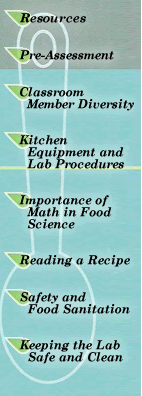
 Within a Family and Consumer Sciences department there exists no public relations tool that is more important or more noticed than the Nutrition and Food Science laboratory. It is expected that this facility and the activities therein will simulate settings in the home, in the science laboratory, and in the production areas of business, and, importantly, that the Family and Consumer Sciences teacher will be expert in all three arenas.
Within a Family and Consumer Sciences department there exists no public relations tool that is more important or more noticed than the Nutrition and Food Science laboratory. It is expected that this facility and the activities therein will simulate settings in the home, in the science laboratory, and in the production areas of business, and, importantly, that the Family and Consumer Sciences teacher will be expert in all three arenas.
Moreover, it is expected that the laboratory will enable students to engage in problem solving, higher cognition, and inductive thinking. Skills learned in the laboratory should be transferable to the world of work and to the student's experiences in the setting of home and family.
This guide has been developed and field tested in junior and high school classrooms. The intent was that it be utilized as needed by individual teachers, in part or as a whole, to supplement nutrition and foods science curriculum.
Included in this guide are units on mathematics and kitchen design. Concepts related to both are basic to management in the foods laboratory.
All nutrition and food science classes need to have management and introductory units in place. What is contained in this guide is based on belief that the teacher has started their FOODS & NUTRITION 1 / 2 courses with CLASSROOM AND LABORATORY MANAGEMENT. Published in 1992 and revised in 2006.


 UTAH EDUCATION NETWORK
UTAH EDUCATION NETWORK

 Justin
Justin Braxton
Braxton Dani
Dani Kayla
Kayla Katie
Katie Lora
Lora Rob
Rob Val
Val

